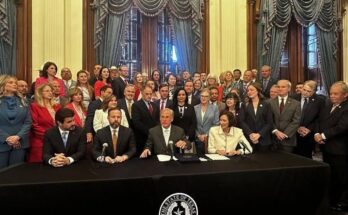While the world watched his public life, Charlie Kirk was living a secret one. His sister just revealed that in his final months, he was silently paying strangers’ hospital bills and visiting veterans.
Posted by
The air in the chapel was heavy, thick with a collective, silent grief. Row upon row of friends, family, and colleagues—many of them familiar faces who had stood by his side or debated him under bright lights—sat in somber stillness. Then, Mary Kirk, her face pale but resolute, approached the podium. Her fingers gripped the wooden edge, a small, trembling anchor in a sea of sorrow. The room held its breath, expecting the requisite platitudes, the shared memories, the celebration of a public life.
What they received instead was a revelation.
Mary Kirk did not speak of the man the world thought it knew. She did not list his accomplishments or his public battles. With a voice that was at once fragile and piercing, she pulled back the curtain on the man she knew—her brother, Charlie.
“He carried so much more than anyone ever saw,” she began, her words cutting through the silence. It was a confession, delivered in the form of a eulogy. It was the story of a man who, behind the confident speeches and the unwavering public persona, was quietly battling a profound weight.
She spoke of the loneliness that often accompanies a life lived in the public eye. She shared details of late-night phone calls, long after the cameras were off and the crowds had gone home. In these quiet, desperate hours, he would call her, his voice stripped of its usual bravado, asking questions that haunted him. Was he doing enough? Was he being enough?
“He once told me,” Mary shared, her voice catching as tears glistened in her eyes, “‘Sometimes the loudest man in the room just wants someone to listen.’”
That single sentence landed with the weight of a physical blow. Around the room, people who had known Charlie for years, who had worked with him and argued with him, looked down. Some began to sob quietly, not just for the man they had lost, but perhaps for the man they had never truly seen. The confession painted a devastating portrait of a figure whose entire career was built on being heard, yet who privately felt profoundly unheard.
The public Charlie Kirk was a man of certainty, a leader who projected strength and conviction. The private Charlie, as revealed by his sister, was a man grappling with the immense burden of expectation, terrified of letting people down, and starving for a simple, human connection that his fame and position made nearly impossible to find.
But the weight he carried was not just his own. Mary revealed a side of her brother that he had deliberately, carefully, kept hidden from the world. In his final months, as the public scrutiny intensified, Charlie had been living a secret second life.
It was a life of quiet, anonymous compassion.
Mary spoke of how he had spent his last months seeking out ways to alleviate the suffering of others, never wanting an ounce of credit. He would find families struggling with crippling hospital bills and pay them off anonymously. He sent significant donations to small, local charities without fanfare. He would slip away, without security or staff, to visit veterans in care facilities, spending hours just listening to their stories—offering the very thing he himself craved.
“He didn’t do it for the cameras,” Mary insisted, her voice gaining a note of strength. “He didn’t do it for recognition. He did it because he knew what loneliness felt like.”
This was the core of the revelation. His secret charity wasn’t an obligation; it was an act of identification. He saw his own pain reflected in the struggles of others. The man who felt the crushing weight of expectation understood the burden of a medical bill. The man who felt isolated in a crowd understood the loneliness of a veteran in a quiet room. His public battles were loud, but his private compassion was silent, targeted, and deeply personal.
As she prepared to step down, Mary Kirk offered one final, defining image of her brother. Her voice broke, but she pushed through the tears to deliver the words that would forever change how he was remembered.
“He carried the world on his shoulders—not because he had to, but because he couldn’t stand to see others fall.”
She finished her speech and returned to her seat. The silence that followed was different from the one that had preceded her. It was no longer just the quiet of grief; it was the profound, deafening silence of understanding, of shock, and of regret. There was no applause. No movement. There was only the echo of a truth that had been kept hidden for too long.
In those few, heartbreaking minutes, Mary Kirk had done more than eulogize her brother. She had re-introduced him. She had shown the world the hidden engine that drove the public figure—a man whose greatest legacy was not the noise he made, but the silent compassion he gave, fueled by a private pain he could never bring himself to share. The world would remember the leader, but thanks to his sister, they would finally know the man.



